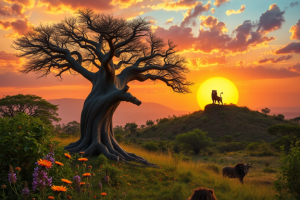Personally, I am a fan of Naguib Mahfouz, the most celebrated Egyptian author who has written extensively about his country’s ancient as well as modern civilizations. His oeuvre includes many novels and short stories, non-fiction as well as film scripts. It is largely in recognition of his long literary career and his portrayal of the dramas of modern Egyptian society and its history that he received the Nobel Prize for Literature in 1988, making him the second African writer to win the coveted prize after Wole Soyinka.
In Naguib Mahfouz’s fictional world, the Nile river flows in the pages of his books as witness to Egypt’s modern political and social history in an epic way. “His realism is like Michael Sholokhov’s in his epic And Quiet Flows the Don, the epic fictional narrative of the early years of the Russian revolution. When opposing forces were fighting decisive battles on the shores of the mighty Don River, the Cossacks on the one side and the Red Army on the other.
One of his earlier works uses the Nile as backdrop to social drama and is entitled “Adrift on the Nile” which is, “a 1966 book by Egyptian author and Noble Laureate Naguib Mahfouz. The novel was later made into a 1971 film under the title, “Chitchat on the Nile”. The Difference between Sholokhov’s “And Quiet Flows the Don” and Mahfouz’s “Adrift on the Nile” is that the former deals with war while the latter deals with peacetime social drama. The theme of this book deals with, “the absurdity and emptiness of life in Cairo and the yearning for serious existence.”
The second difference between the two is that Mahfouz goes back in time to bring ancient Egypt alive while Sholokhov wrote about Russia in the early years of the 20th century when the Bolsheviks were fighting to control it. Mahfouz has written notable fiction using the Nile as a backdrop both realistically or metaphorically. As an artist, he never made political statements concerning the mighty river or engage in discussions in the context of the claims by Egypt that the river was its sole property based on the British colonial agreement. Mahfouz writes about the Nile outside politics as an act of artistic creativity with fictional characters and settings and themes.
Both Egypt and Ethiopia were connected to ancient Greek civilization in different ways. in the case of Egypt, “Ancient Egypt and Greece were both civilizations that were located adjacent to the Mediterranean Sea, though they had different climates. Both produced artistic works that influenced later civilizations and they were both conquered by Alexander the Great and later by the Roman Empire, which linked them politically.”
Like Egypt, Ethiopia too is home to an ancient civilization going back to the times of the Greeks. According to one historical account, Greeks established colonies in Ethiopia with Ptolemias Theron and Axum becoming major capitals of Ethiopian Greek culture. In the second century BC, Ptolemy III Euergetes annexed several northern Ethiopian cities such as Tigray and the port of Adulis, which became major trading hubs for Ethiopian Greeks.”
Another historical reference maintains that, “the Ethiopians Herodotus described was thought to be the tallest and most beautiful people in the known world. On average, they could apparently live to one hundred and twenty years of age, a feat attributed to their water source which oddly smelled like violets and gave off a sheen like oil.”
An article by C. Keith Hansley in the blog page “The Historian’s Hut” relates that, “Ancient Greeks oddly believed in supernatural Ethiopia with super-human Ethiopians” and says that “In ancient Greek mythology and The Histories of Herodotus, Ethiopia was described as a truly special and unique place. The land was favored by the Greek gods-the poet Homer, repeatedly wrote of Poseidon visiting Ethiopia within the pages of The Odyssey.”
Although both Egypt and Ethiopia had links to ancient Greek civilization, Egypt and Ethiopia too share a common past as they were both related to one another throughout their ancient histories. “Egypt and Ethiopia were closely connected through diplomatic and economic activity along the Red Sea routes. By about AD 350, the archbishop of Alexandria in Egypt had appointed a Syrian called Frumentius as bishop of Axum in Ethiopia.”
It is believed that Egyptians were the first to identify a name for Ethiopia, which was then known as Upper Nubia because they identified it in relation to the southern portion of the Nile River. “The southern portion, which extended north to the southern end of the second cataract of the Nile, was known as Upper Nubia; this was called Kush (Cush) under the 18th dynasty pharaohs of ancient Egypt and was called Ethiopia by the ancient Greeks.”
Many civilizations and generations in both Egypt and Ethiopia have come and gone but the Nile River is still emptying itself into the Mediterranean Sea. The Nile is the second longest river in the world after the Amazon in Brazil. The modern history of the Nile as well the relationship between Egypt and Ethiopia has undergone changes and transformations. As times changed new issues were brought to the front and the two countries are committed to making the Nile a river of African solidarity, cooperation and development. There is no time to lose because the entire world is working hard to turn challenges into opportunities. Of all the continent, Africa has no time to squander in disputes over this or that issue.
Fortunately, there is no misunderstanding in the modern world that cannot be overcome through diplomacy or dialogue on a win-win basis. Unlike the Greeks and Romans, modern civilization has provided nations with the means to coexist peacefully by utilizing their common resources like the Nile River to the benefits of their peoples. The story of the Nile is also the story of modern Africa given the high number of potential beneficiaries from this great natural endowment.
Despite the ups and downs, the ebbs and flows in bilateral relations between Egypt and Ethiopia, the two countries have a strong awareness of their common history and the common source of their ancient as well as modern civilizations. Both Egypt and Ethiopia are too big to fail to grasp the significance of their past and its impact on the present and the future generations.
Egypt ad Ethiopia have proved to the world that they have no conflicting interests as countries sharing the waters of a common river and as Africans vying for their common survival. Egypt is fighting for its survival as does Ethiopia that cannot continue to provide food for its people and raw materials for its industries without developing its rivers, and the Nile in the first place. Egypt too has a high stake and a legitimate concern in the equitable, just and continued supply of water to its people it economy and its survival in general. As the two countries have common objectives and are living in the same geographic area as neighbors, they have the will and honesty to settle any dispute with dialogue, and agreement based not on old pre-colonial claims but on present and future expediencies. Neither geopolitics nor foreign involvement in this purely African issue should be allowed to muddy the waters. In other words, both Egypt and Ethiopia can approach the issue with an African mentality and find an African solution to this African challenge.
In the distant past, the two countries built ancient civilizations they are now proud of while the Nile flowed quietly and emptied itself into the Mediterranean Sea. Now, the Nile is waiting the two countries to make use of it in the spirit of their ancient wisdoms so that other African countries would make use of it and make Africa great again. Without going into the details, we can remain optimistic that these two ancient civilizations will live up to the challenges and forge a shared destiny with the great Nile at the center of their shred hopes in a bright African future.
BY MULUGETA GUDETA
THE ETHIOPIAN HERALD WEDNESDAY 13 SEPTEMBER 2023




